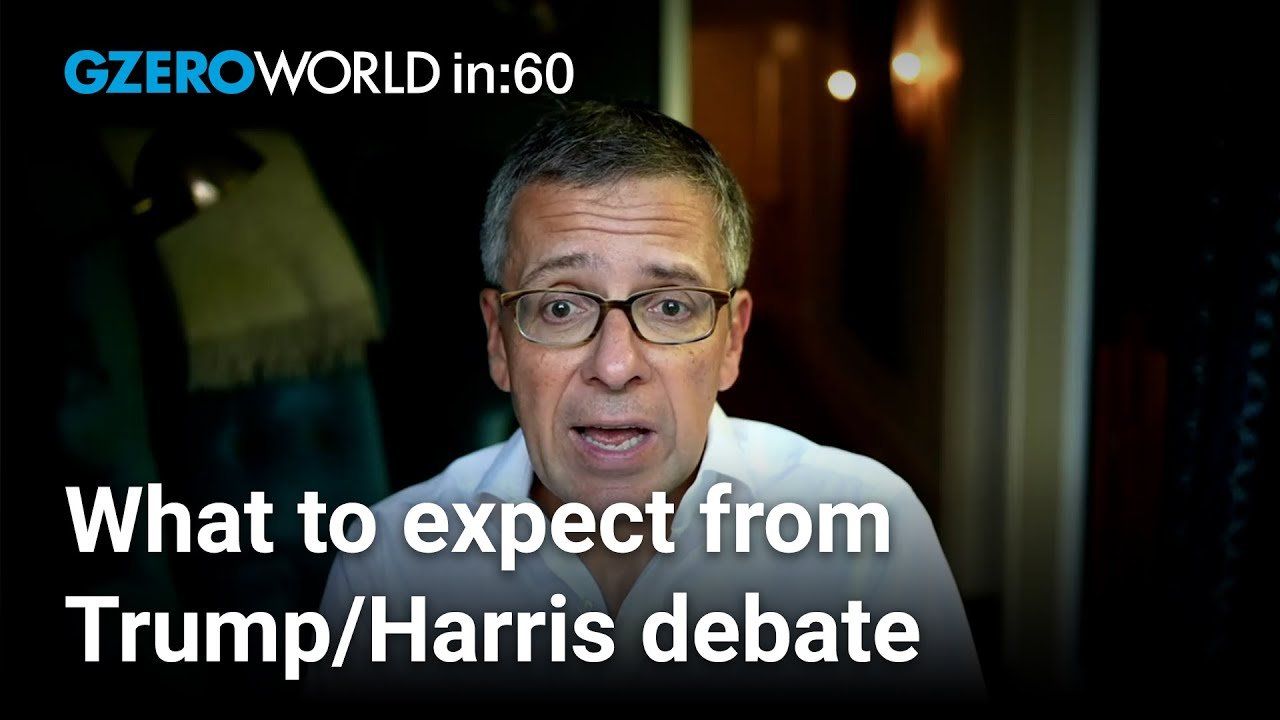Ian Bremmer shares his insights on global politics this week on World In :60.
What issues will dominate the Trump/Harris debate?
Well, I mean clearly the economy, migration, abortion, I mean these are the issues that are on top of everybody's agenda. I care the most about global issues, foreign policy issues, things like climate change, artificial intelligence governance, and say, the Middle East, China, and Russia. But I suspect that that gets a small amount of time and also is a very little impact to voters that has still undecided. Having said all of that, I don't think this is mostly about issues. I think this is mostly about how does Harris perform against Trump and vice versa. And keep in mind that given just how filtered people's information sources are, if one of them wins by a little bit, then both sides are going to come away saying we destroyed the other, and so will all of their supporters.
So I mean, there has to be a big mistake or a big win for anyone to break through in what's an extremely tight race here. And that's what everyone's looking for, especially because Harris hasn't been tested like this before and Trump's last few public appearances have been pretty all over the map and showing his age. So I think people looking for first major test of Harris of this sort and is Trump capable of still delivering big-time entertainment in this sort of a format? So that's where we are. Everyone will be tuned in tonight. I think a lot more than 50 million people in the United States are going to be watching. This should be a highly, highly visible and important. Only two months before the election action.
As Edmundo Gonzalez seeks asylum in Spain, what lies ahead for Venezuela and Maduro's opposition?
Well, the fact that the United States has impounded one of Maduro's planes shows just how much that policy had failed, an effort to try to use carrots to get the Venezuelan government to be willing to hold a free and fair election. That was never going to happen. Not from the Americans, not from the Colombians, not from the Brazilians. Not from the Mexicans. There was no one out there that was going to make a difference. And sadly not Venezuela's opposition either. What this means is the military still supporting the Venezuelan president, massively corrupt, completely stolen illegitimate election and he's not going anywhere. That's where we are. And if Gonzalez hadn't fled the country, he was going to get arrested. Venezuelan military and president, very happy for him to flee the country. They gave him more than enough time and indication saying, "Okay, we're coming for you. We're coming for you. Okay, now we have an arrest warrant. If you don't leave, you're going to jail." He left. And everyone, I guess, is comfortable with that outcome, but a horrible place for the Venezuelan people, millions of whom will be streaming, millions more mostly to the United States, to Colombia, to other countries.
How was Mario Draghi's report on EU competitiveness received?
Received very well because the Europeans are not spending on competitiveness and industrial policy the way the Americans are, the way the Chinese are. And that means that they're being left behind in terms of technology. They're also not spending enough on security, which means they're still super, super dependent on the United States. And Draghi is calling for the Europeans to do a lot more, but they don't have the internal leadership to make that happen, and they don't have the fiscal space, nor do they have the coordination capable, even in a strong European Union. So very welcome. Not going to get implemented. That's where we are. Love Draghi, but he ain't running the EU.
- Harris’ first interview recap: She’s pragmatic, not progressive ›
- Ian Explains: What is Kamala Harris' foreign policy? ›
- Muted mics, amplified impact: Harris and Trump debate for razor-thin margins ›
- GZERO presidential debate scorecard: Rate the debate! ›
- Debate Bingo: Kamala Harris v. Donald Trump ›
- Harris wins debate - GZERO Media ›
More For You
At the 62nd Munich Security Conference in Munich, GZERO’s Tony Maciulis spoke with Benedikt Franke, Vice Chairman and CEO of the Munich Security Conference, to discuss whether the post-1945 global order is under strain or already unraveling.
Most Popular
Zelensky agrees: elections matter #PUPPETREGIME
As more small businesses move sales, payments, and customer relationships online, they unlock new opportunities, but they also become easier targets for cyber-criminals and other threat actors.
When Japanese Prime Minister Sanae Takaichi called snap elections last month, it was a big gamble. Holding a winter election just four months into her tenure with no real policy record to run on?
